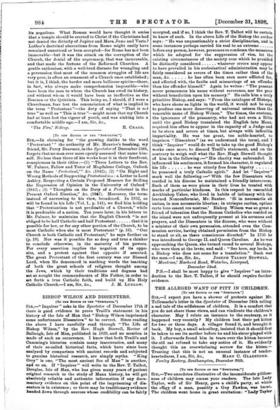[To THE EDITOR Or THE "Sri:el...Tom:] Sin,—In claiming for "the
growing dislike to the word Protestant ' " the authority of Mr. Maurice's teaching, my friend, Mr. Percy Dearmer, in the Spectator of December 24th, forgets that no man ever more openly assumed that name him- self. No less than three of his works bear it in their forefront, conspicuous in their titles :—(1) "Three Letters to the Rev. W. Palmer, Fellow and Tutor of Magdalene College, Oxford, on the Name 'Protestant," &c. (1842); (2) "On Right and Wrong Methods of Supporting Protestantism: a Letter to Lord Ashley, Respecting a Certain Proposed Measure for Stifling the Expression of Opinion in the University of Oxford" (1843) ; (3) Thoughts on the Duty of a Protestant in the Present Oxford Election," &c. (1847). Moreover, the term, instead of narrowing to his view, broadened. In 1832, as will be found in his Life (Vol. I., p. 141), we find him holding that "Protestantism is not predicable of a Church," while it is predicable of a nation. Ten years later, in his letters to Mr. Palmer, he maintains that the English Church "is not obliged to be half Catholic and half Protestant that it is possible for her, or for any other portion of the Church, to be most Catholic when she is most Protestant" (p. 16). "Our Church is both Catholic and Protestant," he says further on (p. 19). Nor was it possible for so deep and true a thinker to conclude otherwise, in the maturity of his powers. For every assertion implies the negation of its oppo- site, and a protest against that opposite if asserted. The great Protestant of the first century was our Blessed Lord, when He denounced in scathing words the teaching of both the great schools of religious thought among the Jews, which by their traditions and dogmas had set at nought the commandments of His Father, in order to set forth a true Catholic faith, and build up His Holy Catholic Church.—I am, Sir, &c., J. M. LUDLOW.


































 Previous page
Previous page